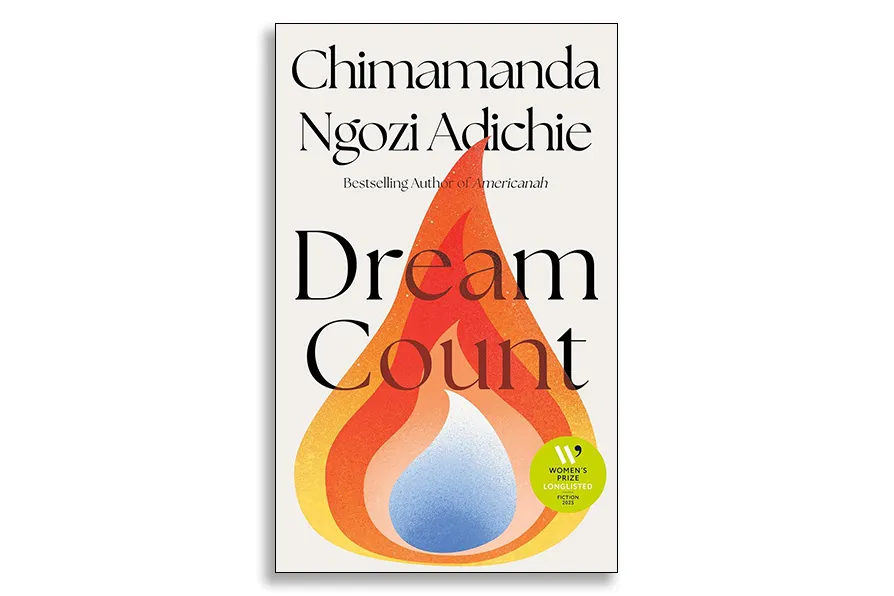JOHN GREEN, MARIA DUARTE and ANGUS REID review Fukushima: A Nuclear Nightmare, Man on the Run, If I Had Legs I’d Kick You, and Cold Storage
FIONA O’CONNOR steps warily through a novel that skewers many of the exposed flanks of the over-privileged


Dream Count
Chimamanda Ngozi Adichie, 4th Estate, £20
“I HAVE always longed to be known, truly known by another human being.” Words spoken by the main narrator Chiamaka (Chia) begin the latest novel by Nigerian writer Chimamanda Ngozi Adichie. Along with her three African women friends, Chia makes up the quartet animating this story of female yearning in what is a kind of Sex in the City for the global traveller.
Adichie fans have had a decade-long wait since her last bestseller, Americanah; they are rewarded with a 400-page doorstopper. Set during the Covid pandemic, it is packed with Adichie’s sparkling writing style, but is somewhat looser in structure than her previous books, particularly her breakthrough Half of a Yellow Sun.
In this book, four women take on the world as middle-aged seekers after love, success, fulfilment. Dream Count opens out seams of women’s experience usually considered marginal to mainstream Western societies. Yet Adichie is keen to disrupt easy associations we might hold. Chiamaka is a self-sufficient heiress with the resources to travel the world on a whim. Her friend Omelogor is a powerful financier expertly funnelling vast sums of corrupt money out of the Nigerian banking system. Third friend, Zikora, daughter of a polygamist father, builds her own life for herself and her son in the rich suburbs of DC.
Making up the quartet, and anchoring the novel, is immigrant Kadiatou, Chia’s part-time maid, a peasant girl from a bush village in Guinea. She is labouring in pursuit of the American dream from harrowing beginnings and with losses along the way.
Kadiatou is inspired by Nafissatou Diallo, the Guinean woman at the centre of the sexual assault charges against IMF former head, Dominique Strauss-Kahn in 2011. While working as a room-maid at a prestigious New York hotel, Diallo was assaulted by Strauss-Kahn. She accused him of forcing her into oral sex. In the era prior to the MeToo Movement, Diallo saw her case dropped by the prosecution and a media piranha-feast into her private life. Adichie says she wanted to “write” a wrong in the balance of this story of invincible power in action.
Adichie’s portrayal of Kadiatou’s life, her village childhood, the experience of female genital mutilation (FGM) which she endures, her marriage leading to life on a hellish bauxite mine, is the book’s greatest achievement. The hotel scene of the sexual assault graphically depicts animalistic aggression erupting out of arrogance: the conviction of impunity: “She was a thing, a thing to own and invade and discard, and this frightened her.” In fact, Strauss-Kahn’s legal team did claim exemption from prosecution based on his IMF status.
Dream Count relies on Kadiatou’s story to drive the narrative overall. Around the glimpses into west African society, the lives of the other three women hover somewhat insubstantially. The text is a gorgeous immersion in the sounds, language, cultural riches of west Africa. But this difference is encoded within a familiar form: the first-world disappointments of romance, male non-commitment and reproductive pressures that only women face.
There is much repetition as failed romantic relationships are picked over. The language of these sequences is sometimes overblown: “I looked at him and gravity loosened and slipped,” Chia remarks on meeting Darnell.
While Adiche skewers many exposed flanks of the overprivileged in these sections, burning through social complacencies built on disguised racial bias, it is hard to care very much about characters with such pampered lives.
It is Kadiatou who offers deeper engagement for the reader. Yet the Kadiatou section is left suspended for much of the book as the reader is returned to scenes of aspiration and wealth: servants bring breakfasts on lacquered trays, multiple SUVs bulge from car ports, and the novel loses traction. In a sense there are two distinct novels here. The story of Kadiatou exists as an attachment; she lives precariously, distanced from the lives of Chia, Omelogor and Zikora, and the lesson of Dream Count concludes that class differences are insurmountable.
Ultimately, Kadiatou cannot be saved despite the wealth and education of her “friends.”

FIONA O'CONNOR recommends a biography that is a beautiful achievement and could stand as a manifesto for the power of subtlety in art

FIONA O’CONNOR is fascinated by a novel written from the perspective of a neurodivergent psychology student who falls in love











